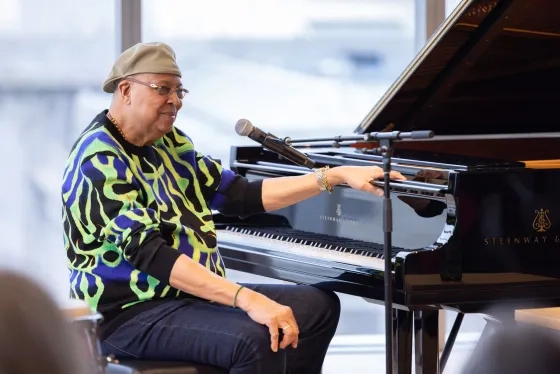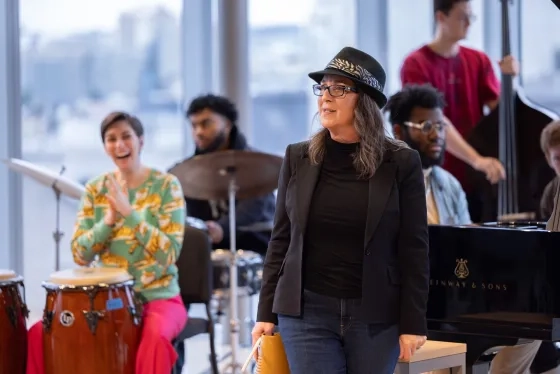Cuban Jazz Icon Chucho Valdés Arrives at SFCM for Masterclass
News StoryStudents from the Roots, Jazz, and American Music department played for Valdés following his career-spanning lecture.
"There's Cuban music before Chucho and after," SFJAZZ's Director of Education (and SFCM's Latin Big Band director and faculty member) Rebeca Mauleón said by way of introduction at Valdés' February visit to SFCM. "So we're going to trace the lineage of Afro-Cuban piano through his hands and his heart."
That's just what the pair did, with Mauleón translating for Valdés as they recalled his career from Cuba to Blue Note Records to seven-time GRAMMY Award-winning (and four-time Latin GRAMMY winner) bandleader and composer. Valdés played a handful of music that inspired him as a budding musician and highlighted a number of artists he credited with his development as a musician, including his father Bebo Valdés, as well as musicians he was influenced by, like Art Blakey and the Jazz Messengers. He discussed how adding Cuban musical patterns like the tumbao and montuno to the minor blues forms he heard being played by pianists in American bebop jazz helped him find the composition voice he'd become famous for.
The lecture's broader historical context was educational across a variety of topics, including how Cuban musicians weathered the Cuban Revolution, which impacted the social and musical relationship between the United States and Cuba and resulted in less of the cross-cultural exchange that made Cuban jazz possible. This forced Valdés and his peers to listen to short-wave radio broadcasts and record them onto tape to hear the sounds of American pianists like Herbie Hancock, Bill Evans, Cecil Taylor, and Chick Corea. He discussed how, as the 1960s went on, the rhythmic influence of the nascent rock-jazz and fusion scene—bands like Earth, Wind and Fire and Chicago, and leaders like Mongo Santamaría—inspired him to drop rhythm patterns like the clave over odd-metered phrase. Another of Valdés' innovations at the time was to use Cuban batá in his recordings: Previously, the drums were an important part of religious Santería rituals in Cuba, but had never been used in a secular music context. (Other stories included his connection with figures like Muhammed Ali and Nelson Mandela.)
A number of RJAM students took to the stage to play for Valdés after Mauleón translated some of Valdés' advice to budding SFCM musicians interested in combining musical traditions as he did: "As long as you make them dance, you can throw some Shostakovich on there, and no one will be the wiser." The pianist also revealed that, at 82, he's still trying new things and is writing a piece for Afro-Cuban-style piano and symphony orchestra he hopes to premiere next year. The lecture concluded with an ensemble of RJAM students performing for Valdés, who ultimately told students, "You should never work based on what you think success is going to bring you. Don't be consumed with success, you just have to work hard. If it comes, it's blessed and welcome, but you only get out of it what you put in."
Watch Chucho Valdés' entire masterclass below, and learn more about studying Roots, Jazz, and American Music at SFCM.

